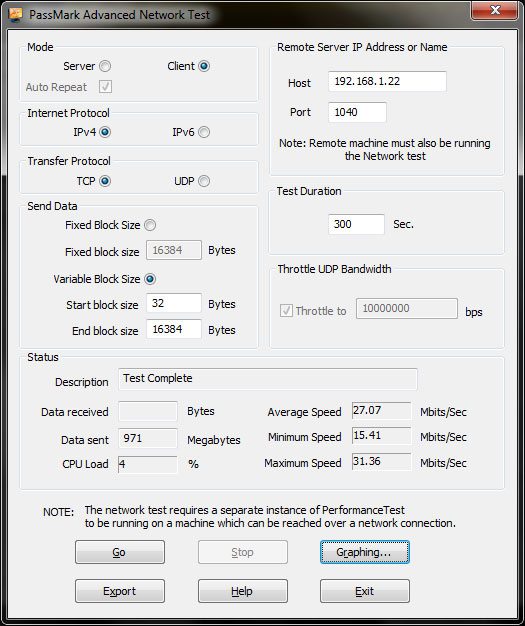Linksys WRT1900AC Dual-Band Wireless Router Review
Chris Hadley / 10 years ago
PassMark Advanced Network Test & Baseline LAN Performance
The PassMark Advanced Network Test is designed to test the data transfer rate between two computers. One of the systems acts as the server and will sit waiting for a connection whilst the other computer acts as a client. The client connects to the server and sends data to it for the duration of the test.
The network benchmark test will work with any type of TCP/IP connection. Including Ethernet, dial-up modems, ADSL, cable modems, local area networks (LAN), Wide area networks (WAN) and wireless networking (WiFi). The software has been optimized to use a minimum amount of CPU time, allowing even high-speed gigabit Ethernet connections to be benchmarked.
Users have the ability to change the following test parameters.
- The IP address of the machine acting as the server and the port number used for the test to help with firewall issues.
- The size of the data block used for each send request. It is also possible to select variable sized blocks to measure performance deltas as block size increases or decreases.
- The duration of the test.
- The protocol, either TCP or UDP. The TCP protocol is when data integrity is important (Errors are corrected using data re-transmission). UDP is used with applications that are tolerant to data loss such as video streaming.
The Advanced Network Test is part of the PerformanceTest suite which can be found on the PassMark website.

In each of our test configurations, the wireless router is tested at three different ranges, the first running within 10ft of the wireless client (in this case our test bench with the PCIe wireless card) and with a direct line of sight. After this the router is moved into another room around 20ft away without a direct line of sight. Moving even further away the router is placed at a range of over 40ft to push the wireless transmission to the max. In all situations, the router is tested in an environment where the building has solid brick walls and is connected to a laptop at each range to act as a local test client.
In each of the test charts, red indicates the furthest test, green the mid-range test and blue the direct line of sight. Where applicable the adaptor is tested on both the 2.4GHz band at 802.11n speeds and on the 5GHz band at 802.11ac speeds where available.
Fixed Block Size
To test the maximum throughput speed that a connection can handle, a fixed block size of 16384 Bytes is sent from the client to the server over a period of five minutes. The higher block size will allow the transfer rate to stay as high as possible – in the same way that large files transfer from one drive to another quicker than lots of small files of the same total size.
Variable Packet Size
In a real world situation, the blocks of data that pass through a network adaptor are not of the same size each time, so to give a more realistic impression of how an adaptor performs, the adaptor is once again tested for a period of five minutes. This time however, the block size will vary from 32 Bytes up to 16384 Bytes in increasing steps of 148.7 Bytes each time.


Wired performance is where we would expect to see most routers performing on a similar level however surprisingly on the consumer end of the scale this is not the case. That said though, the WRT1900AC is notably faster than any other router that we’ve looked at to date – pushing speeds close to the theoretical limit that Gigabit Ethernet can handle.



















